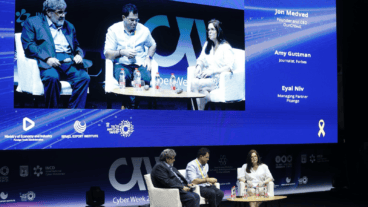‘Every 10 to 12 seconds, someone in London, Paris, Beijing, New York, San Francisco buys a DiskOnKey’ – Dov Moran, CEO and President of M-Systems. Like Alice in Wonderland who drank from a magic bottle and got smaller and smaller until she was able to fit through a keyhole, flash technology has made it possible to miniaturize and store large amounts of computer data on a silicon chip. And, go anywhere.
Tagged onto a giant blue whale, the chip helps to discover the secrets of marine life and expand scientific knowledge. In a mobile device on the golf cart, a GPS with a video display, it tips off the golfer, giving distances to the next hole, hazards, and even provides sport and financial ticker info, and an option to order food. The chip is in a multi-media device in the kitchen which allows the viewer to monitor the baby, watch the news, and get a new recipe. It is used to read bar codes, for interactive video on demand, and in a tough metal casing for public safety systems, fire control systems, ATMs, aerospace applications, and dozens of other 21st century needs.
An Israeli company M-Systems, which is a leader in developing flash-based data storage products, is the brain behind DiskOnKey, the first (and the most powerful) portable keychain storage on the market. U.S.-based CapMed has designed a patient-controlled Personal Health Key based on the DiskOnKey which captures data from physicians, hospitals, medical imaging, insurers, pharmacy, and labs.
The DiskOnChip and DiskOnKey line of products are small, lightweight, durable, reliable, tamper-proof, and consume very little power. The very rugged, very high capacity FFD (Fast Flash Disk) line withstands harsh conditions and does the job of a conventional rotating hard disk.
Flash technology puts older technology to shame. Hard disks are big, heavy, noisy, power guzzlers; floppy disks have low capacity. Both hard disks and floppy disks are delicate mechanical devices with spinning parts that can break.
The Kfar Sava-centered M-Systems was the first to patent (with its proprietary algorithms) and the first to introduce key chain storage. In July, M-Systems introduced the world’s smallest 1-gigabit flash-based storage for mobile devices. And just last week, the company unveiled KeyComputing, a new subsidiary charged with extending the Smart DiskOnKey platform into new vertical markets.
M-Systems says KeyComputing will cooperate with strategic partners in the development of solutions that extend the mobility, security and ease-of-use of IT in the enterprise.
“Every 10 to 12 seconds, someone in London, Paris, Beijing, New York, San Francisco buys a DiskOnKey,” said Dov Moran, CEO and President of M-Systems. Moran, a former Commander in the Israeli Navy, has a right to be proud of the high-sailing, pioneering product. DiskOnKey is breaking records, selling at 200,000-250,000 a month. With companies like IBM and Microsoft among its biggest customers, M-Systems’ sales are expected to top $60 to $70 million in 2003.
The first, and still the fastest, most reliable, pen-sized computer storage system on the market, DiskOnKey can be clipped on to a shirt pocket or to your keychain. Depending on the model, you can save and transfer the data you need – Word documents, songs, pictures, PowerPoint presentations, digital video. You can plug into any PC and laptop with a USB port and begin work. It works on Macintosh, Linux and Windows-based computers. High speed (it has its own processor), large capacity (up to 1 gigabyte), no need to worry about losing data in a power failure – are all benefits. Some people use it for a backup. One person I know keeps it under his pillow when he goes to sleep at night.
The award-winning, power-packed, key-chain sized computer storage product was barely off the manufacturing line in 2001 when it was selected as ‘the Best Product of the Year’, by Electronic Products and PC Magazine.
Among its fans are Business Week which gave it the Industrial Design Excellence Award in 2001, and CBS News.com, which put it on its Holiday Wish List for 2002. The Wall Street Journal cited it as the ‘leader in the keychain modules category.’ In the August 11 issue, Fortune Magazine’s Peter Lewis chose DiskOnKey for storage for the most powerful PC, nixing a floppy disk.
“‘Who needs it’ we were asked by analysts when we first decided to develop the miniature storage,” said Moran. “They asked the same question when we decided to develop a DiskOnChip flash disk for mobile devices. Today, DiskOnChip is used in four out of five of the top handset (mobile) design devices.”
Sitting in a conference room in M-System’s spacious headquarters in Kfar Sava, Moran talked about how he started the company more than 10 years ago.
“I recruited all the best men I knew in the Navy,” said the CEO. Moran, himself, graduated with honors in Computers and Electronic Engineering from the Technion in Haifa, Israel’s prestigious Institute of Technology, and was an honor student in the MA Business Program at Tel Aviv University.
Recruiting a high quality team from the Navy (Army, or Air Force) for a business venture has been a successful model for some of Israel’s most successful companies. The company’s first flash technology products were for the military.
The Fast Flash Disk (FFD) product line is M-Systems’ most rugged line designed for mission critical systems. It stays on keel within temperature extremes, shocks, and changes in altitude. Besides the military, M-Systems has developed the line for aerospace, reconnaissance, telecommunications and public safety. It is included in black boxes, radar and industrial automation, to name a few applications.
“We realized that the same technology could have commercial applications,” said Moran.
At the end of July, M-Systems and Toshiba formed an agreement which raised their strategic relationship to an unprecedented level. As part of this agreement, Toshiba put in $4 million, giving them 1% ownership of M-Systems. In the last 10 years, M-Systems has come a long way. The $4 million raised through the agreement with Toshiba “is symbolic,” said Moran.
In a hopping week with 7 major press release announcements, M-Systems also signed important agreements with a new U.S. distributor and Palm, producers of the popular operating system for handheld computers In addition, Motorola and M-Systems announced that they would work together to enhance Motorola’s mission-critical devices used for public safety
The company has other strategic relationships with several large companies – including Microsoft, Texas Instruments, Symbian and AMD. IBM is one of its biggest customers. It has offices in California, Massachusetts and North Carolina as well as Taiwan, Japan, China, and Austria.
M-Systems is constantly improving it products, adding security features, capacity, error detection and correction, “smart” features, and applications. All the R&D is done in Israel.
“Quality, innovation, and persistence are three principles in our credo,” says Moran, pointing to a poster on the wall. His target: to build a large company that makes the world a better place to live in. And he has a dream: to build production facilities in Israel where half the workers are Arab and half Israeli.












